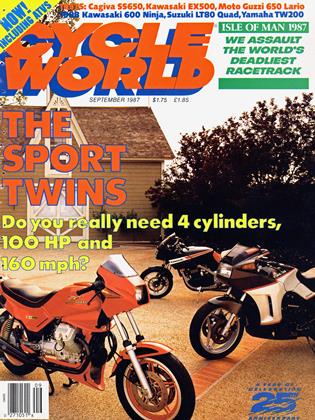Grass-Roots Saviors?
ROUNDUP
CAMRON E. BUSSARD
DEEP IN THE HEART OF T EXAS. AND THE BEEHIVE STATE OF Utah, might seem like the last places on Earth you'd look for the salvation of American motorcycling. It’s there, though, where you'll find a pair of candidates for the task: the Texas Sport Bike Association and the Utah Sport Bike Association, non-profit organizations open to riders of every stripe, despite the Sport Bike appelation. And although the names correctly suggest a certain connection —indeed, a USBA alumnus founded the TSBA—they’re autonomous.
Still, at first blush the two appear almost indistinguishable from dozens of loosely knit clubs around the country. For example, both associations’ dues net their members T-shirts, newsletters, monthly meetings, Sunday morning rides, and discounts on parts and accessories from participating dealers. Plus, the Utah group organizes its own roadraces, and the Texans (Austin chapter) provide a chase truck for the Sunday rides, as well as 24-hour road service. Hardly the makings of salvation, right?
But the TSBA and USBA distance themselves with seven-league strides from ordinary clubs, by investing sizable chunks of time and energy toward improving motorcycling’s image, providing members with rider education programs, and taking the first steps on the path of political activism. In short, the TSBA and USBA are making a full-frontal assault on some of the thorniest problems facing motorcycling today.
That's heady stuff for a pair of fledgling, grass-roots organizations with hardly 300 members between them. But on each front they’ve made measurable progress that belies their youth and size.
The USBA, for instance, offers riding clinics and MSF courses, and the more recently founded (April, 1987) TSBA should have similar programs by now. The Texas faction, though, got some special assistance through their public-relations efforts. The local constabulary's dim view toward sportbike riders prompted the TSBA to invite a policeman to one of their meetings; but the affair went beyond mere fence-mending when the officer—an MSF instructor—volunteered to help set up TSBA’s rider training. Moreover, the TSBA recently lobbied successfully against a mandatory helmet-use law, and both groups do various types of charity work intended to boost their public image.
If, however, you're thinking that sending a helmet law down in flames in Texas, and charity work in Utah, don’t mean squat in the larger picture of motorcycling in this country, you're right—up to a point. But imagine such local actions in every state; the cumulative effect would be widespread.
In fact, with enough groups like the TSBA and USBA, maybe we could finally drive a stake through the public image that’s dogged motorcycling for decades. Rider education—which gets more crucial as bikes get faster and more competent—might become an integral part of learning to ride. And maybe we'd have enough political clout to make ourselves heard. Such organization would put motorcycling in charge of its own fate, instead of being at the mercy of it. Surely that would be salvation.
To that end, riders interested in starting their own chapters can get advice and encouragement by contacting Joel Mosher, president, or Eric Helmick, vice-president, Texas Sport Bike Association, P.O. Box 3193, Austin. TX 78704; (5 12) 388-35 10 or (512) 462-3 1 52. And the same goes for Jim Billingsley, president, Utah Sport Bike Association, P.O. Box 26791, Salt Fake City, UT 84 1 26; (801 ) 582-1175. -Charles Everitt
 View Full Issue
View Full Issue
More From This Issue
-
 Editorial
EditorialThe High Cost of Higher Performance
September 1987 By Paul Dean -
 At Large
At LargeCoached To Success
September 1987 By Steven L. Thompson -
 Letters
LettersLetters
September 1987 -
 Evaluation
Evaluation"The Care And Feeding of Your Motorcycle"
September 1987 -
 Roundup
RoundupShort Subjects
September 1987 -
 Roundup
RoundupEven the Police Feel the Need For Speed
September 1987







